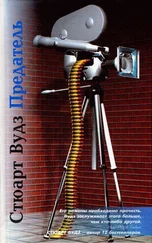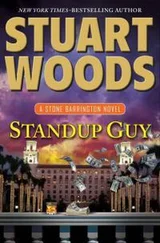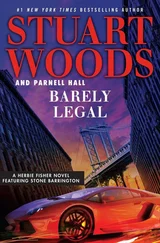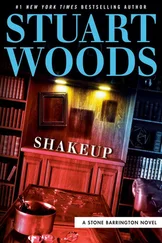If Roger had been slow on the uptake that would have brought him up short. “Ah, yes,” he said.
“Did you know Philby, Roger?”
“Oh, no. He was before my time. Everyone who knew him spoke of his charm and wit.”
“He spent a number of holidays here. Once we had his friend Guy Burgess for a visit, but he was so drunk all the time I doubt if he remembered it later. He wasn’t invited back.”
Alex got to his feet. “Well, I’m going to turn in. It has been a long day. You two finish your brandy.” He gave a little bow, then left the room.
Jennifer leaned over and whispered in Roger’s ear, “Don’t say anything in this house or on the terraces, unless you want it recorded,” she said.
Jennifer shook him gently awake at eight AM. He shaved and showered, then was called to breakfast on the terrace — lots of smoked fish, eggs, and salads.
“It’s time to go downstairs,” Jennifer said. “Alex is expecting you.”
Roger took a seat across from Alex at a small table in the library, in a nook overlooking the sea. It was a windy day, and there were whitecaps to be seen.
“Now,” Alex said. “You are being recorded, of course.”
“Of course,” Roger replied.
“I am going to ask you many questions,” Alex said. “If you answer truthfully and give me your best recollections, we will not have to accomplish this interview by other means.”
“All right,” Roger said.
“What is your first memory of being at the Britannia Royal Naval College in Dartmouth?”
“Being in a fight,” Roger replied without hesitation. “An older boy tried to bugger me in my bed, and I gave him a bloody nose. I wasn’t bothered again.”
“Describe the first meal you ate there.”
“I arrived in the late evening, so my first meal was breakfast. I was given kippers, which I did not like but learned to like, a fried egg, and a piece of toast, tinned orange juice, and strong tea.”
“Describe your first class at Dartmouth.”
“It was an orientation class. We were shown a slide — an aerial photograph of the school — and various places were pointed out on it. We were given a rule book and told to memorize it before the next day, then we were issued uniforms and taught how to wear them properly.”
“Who was the first other student you met?”
“Timothy Barnes,” Roger said. “We got on immediately.”
“Did you have a homosexual relationship with Tim Barnes?”
“No, but I knew he was queer.”
“How did you know?”
“Something in his manner toward me. He realized at once that I was not queer, and it never came up again. I knew he had dalliances with some others, though.”
“Did you keep a diary or journal?”
“I did for a few days, but we were kept very busy, and I discovered, anyway, that I was not a good journal keeper. I preferred to rely on my memory, which is excellent.”
“What did you excel at when you were at Dartmouth?”
“There was no one thing, but I was good at everything they threw at me.”
“Were you promoted while a student?”
“Yes, but always just behind Tim. He was a more attractive personality than I, and I knew it, so I felt no resentment. He finished as the student commandant, and I was his executive officer.”
Alex droned on with his questions, as much to get Roger comfortable with answering him as to glean actual information, since most of it was in Roger’s dossier, anyway. He was impressed with the clarity and accuracy of Roger’s answers.
He took Roger through his early assignments after graduation, then suddenly asked, “Who was Simon Garr?”
Roger blinked and took a moment to answer. “He was a class ahead of me at Dartmouth and we shared some assignments afterward.”
“Did you know Simon to be homosexual?”
“I surmised it. He was the boy whose nose I bloodied my first night at Dartmouth.”
“Did you ever report him to a superior as being queer?”
“No, but I let him know that I could, and if I did, he would be cashiered.”
“Did you use this knowledge to extract favors from him?”
“Only once, when a promotion was at stake. After that he was very helpful to me without being asked, because he knew I could destroy him, if he crossed me.”
“Were there others, like Simon, in this position?”
“Oh, yes. I seemed to have a gift for spotting them, and I always found a way to let them know I knew. They were very helpful throughout my career.”
Alex changed course. “Describe the entryway into the offices of MI-6.”
“There was a front door, but it was infrequently used by officers. On my first visit there I was told to knock at a rear door in an alley off Shaftesbury Avenue.”
“Was there a code pad for entry?”
“No, just a knocker and a small window. The door was opened by a commissionaire — you know what a commissionaire is?”
“Of course. Describe the man.”
“Imposing. Six foot three, sixteen stone, florid complexion, gray hair, quite fit for his age.”
“What was his name?”
“I never asked, and no one ever told me.”
“Describe the route to the director’s office from that rear door.”
“Elevator to six, right turn, thirty feet down the corridor, double doors to the left.”
“And your office?”
“Another thirty feet beyond those doors, facing the corridor.”
“What was on the subbasement floors?”
“A canteen and the armory; that was all I ever saw there.”
“What weapons were you issued?”
“A Colt Government .380 with a silencer, a switchblade knife, and a holster that held all of it.”
“When you left the service were they reclaimed?”
“Yes, on the way out the door.”
“But not your diplomatic passport?”
“No.”
“Did that surprise you?”
“I gave it no thought until I took it out of my pocket and left it in a desk drawer in my flat. I assumed I’d hear from them about it, but I never did.”
“Keep it. It could come in handy,” Alex said. “Describe the director’s office.”
“Big. I should say twenty feet by thirty. A large desk before the windows, with facing armchairs, fireplace at one end, with a seating area; conference table and chairs at the other; naval art on the walls, probably from the National Gallery and the Admiralty; a large, very fine carpet, filled most of the floor; various cupboards and closets behind paneling, probably a lavatory behind a door.”
“What are the electronic defenses of the building?”
“They were not in evidence, but probably rather carefully concealed. I should imagine that the latest in surveillance equipment and recording devices are used.”
“All speech is recorded?”
“That is my assumption. It was never mentioned to me. Rather like this house, I should think.”
The questioning continued until lunch, then resumed and lasted until six o’clock.
But there was more to come.
Fife-Simpson was wakened before dawn, told to dress immediately without showering or shaving, and given a one-piece, sleeveless boiler suit to wear. There was no breakfast, not even juice, and Jennifer was nowhere to be seen.
Two large men hustled him to the basement of the building, and he was shut up in a small, brightly lit room containing only a steel table and chair, both bolted to the floor. Two other chairs rested opposite. There was a mirror at one end of the room, which Roger assumed was two-way, with observers on the other side. None of these features engendered confidence, and he was vaguely anxious.
The door opened and slammed, and the two men who had escorted him to the cellar came in with a man Roger had never seen before. They entered the room and slammed the heavy door behind themselves. Bolts could be heard sliding shut on the other side. The two men, one on each side, fastened Roger’s wrists under steel brackets and locked them to the table with a key.
Читать дальше












